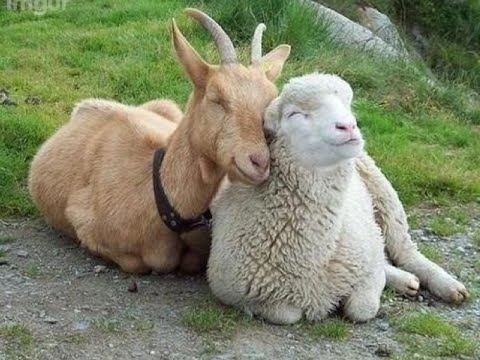By nature, we like to separate things. We like to keep things in their place. We like to distinguish this from that. It’s just part of who we are. Let me give you an example: We separate silverware. We don’t want our forks fraternizing with our knives and spoons. We need to keep them separate. Each of our silverware drawers are segregated. It sounds wrong but it is a reality we all have to come to grips with. We are just natural born separators. We have food pantries and junk drawers and change purses and tool benches and underwear drawers.
Okay for Us, Not for God
We feel out of control when we don’t have all of our items put away in their perspective drawers. I bet some of you are downright OCD about it. We are not only okay with separation, we want it. Except when it comes to our God. We don’t want him to be a separator. We want him to accept everyone and that’s why today’s topic is so difficult. Today I want to look at one particular line in the Apostle’s Creed. The Apostle’s Creed was written thousands of years ago, in the early days of the church, and sums up what we believe in Christians. The line a want to look at today can be a tough one for some and it goes like this:
We believe in Jesus who sits on the right hand of the Father from whence he shall come to judge the living and the dead.
That phrase comes has its roots in a specific passage in the Bible:
31 “When the Son of Man comes in his glory, and all the angels with him, he will sit on his glorious throne. 32 All the nations will be gathered before him, and he will separate the people one from another as a shepherd separates the sheep from the goats. 33 He will put the sheep on his right and the goats on his left. 34 “Then the King will say to those on his right, ‘Come, you who are blessed by my Father; take your inheritance, the kingdom prepared for you since the creation of the world. —Matthew 25:31-34
In this moment we see what many consider an ugly side of God. First, he separates. We are okay with separating when it comes to silverware and laundry but we get very uptight when someone around us wants to separate people. Segregation is an ugly word. But we hear about it all the time. People separate by race, sex, country, economic status, popularity. We don’t like that behavior.
But it gets even more difficult to swallow because not only does God separate in these verses, he judges. He decides who’s in and who’s out. Who’s good and who’s not. Who’s naughty and who’s nice.
This particular part of the Creed proclaims that this God that we serve separates and he judges and you may not have a problem with that, but I guarantee you that you have friends that do. And I can understand that, but today I want to take a closer look at this passage and see if there might be another explanation that will make God’s character and that could make the Apostle’s Creed and God easier to swallow…or should I say, to follow?
The Sheep and the Goats

I don’t think this goat and this sheep want to be separated, do you? But that’s what God says He’ll do in the gospel of Matthew. So my first question is this: what does God have against goats? Why is it that when goats and sheep are mentioned it is the goat who is always bad and the sheep who is always good?
They are pretty similar. They have the same basic hooves. They make the same obnoxious bleating noise. They have those same creepy eyes with the rectangle in them. What’s that all about anyway? Sheep and goats are basically the same, so why is the goat the bad one?
I was talking about this last week with Jonathan, the Worship Director at our church, and I found out that he grew up with sheep and goats. I didn’t know this but it turns out that Jonathan is actually a sheep and goat expert. And do you know what he told me the difference is between sheep and goats? Sheep are easier. They are more docile. Really, they are dumber. Goats, on the other hand are active. They are smart. They are feisty. Sheep are grazers and goats are browsers. Sheep will pretty much just stay in the field and eat grass and you’ll have one stray now and again, but they are pretty easy to deal with. Goats on the other hand will get themselves into all kinds of trouble for food.



See what I mean? It’s pretty darn impressive the lengths that goats will go to in pursuit of food.
Here’s the one more reason why goats are considered bad.
If there are every two identical characters in the movies or on TV and one is good and one is evil, what does the evil one have that the good one does not? A goatee, of course.

That’s all the proof I need. Goats are evil.
Why Sheeps and Goats?
Do you want to know why I think the Bible uses sheep and goats as illustrations of the way God will separate people? First, they are similar. Did you know that on the Chinese calendar there is a year of the goat? Most people call it the year of the sheep. So what is it? The year of the sheep or the goat? It’s actually both. While both hail from the sub-family, Caprinae, sheep and goats diverge at the genus level and arrive as distinct species. Sheep have 54 chromosomes; goats have 60, (5 of which are evil I suspect). Sheep and goats can graze together and are similar but were commonly separated by farmers in Jesus day, so this is something the people in the Biblical age were familiar with.
Second, sheep are generally followers. Goats are not. They go their own way. When God talks about separating sheep and goats he’s really talking about delineating followers from non-followers; those who want to follow his way and those who don’t. Those who follow will spend eternity with God; those who don’t want to follow will be sent to a place the Bible refers to as Hell.
How Could a Good God Send People to Hell?
This is what people hate most about God judging and separating; it’ that he is doing it to send people to Hell. But what is Hell?
When the Bible talks about hell it talks about weeping and gnashing of teeth and burning and a lake of fire, but I believe it uses these descriptions as analogies for how awful of a place it will be. Have you ever burnt yourself? Remember how much the aftermath hurt? Hell is a burning feeling like that, only the feeling never goes away.
Let’s contrast that with Heaven for a second: Heaven is a place where all those desires are fulfilled. Your desire for security. Your desire for healthy relationships. Your desire for peace. Your desire for purpose. Hell talks about a fire that is never quenched. It is just the opposite in Heaven. In Heaven, all those desires that you wanted will never be fulfilled. You see you can only have those desires fulfilled in relationship with God.
Freedom to Choose
So if hell is that awful we think, why would God send anyone there? We talked earlier about two character qualities of God that we aren’t crazy about: we don’t like to be judged or separated. But there’s one thing, one concept, we like even less than judgement and separation: We despise slavery. We hate it when anyone takes away our freedom. If there is anything worse than judging and separating people, it’s having your right to choose taken away from you. Some of the ugliest words in our language have to do with taking away the rights of someone to choose: slavery, trafficking, false imprisonment…all not good words.
In fact, freedom of choice is so important to us as a culture that it is written into our Constitution. It is one of our unalienable rights. But as much as we value freedom of choice, God values it higher than we ever could. He values it so much that he is willing to allow us to choose. We can choose to follow like sheep or we can choose to go our own way like goats.
God doesn’t want anyone to perish. But he values choice so much that he allows each person to choose. Hell is simply God allowing people to get what they have always wanted. And some people will choose to run away from Him their whole lives. They have always wanted to be away from God and He finally gives them what they’ve wanted.
Let me say again that God doesn’t desire to send people to Hell. He wants us all to choose him; He wants all of his sheep to follow him:
12 “What do you think? If a man owns a hundred sheep, and one of them wanders away, will he not leave the ninety-nine on the hills and go to look for the one that wandered off? 13 And if he finds it, truly I tell you, he is happier about that one sheep than about the ninety-nine that did not wander off. 14 In the same way your Father in heaven is not willing that any of these little ones should perish.–Matthew 18:12-14
The Great Commission
Our purpose while we are here is to show the love of God in our words and actions, to show people, all people, how good it is to follow; to help them choose to be sheep.
At the end there will be a Judgement. It’s our job on earth to reach out to people and show them who Jesus is. Let me tell you the best way to do that: Love them.
By this everyone will know that you are my disciples, if you love one another.—John 13:25
- Show and Tell.
- Show them in your actions
- Tell them why you did it.









Leave A Comment